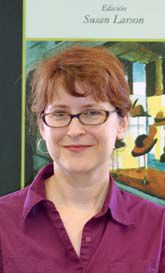by Ana Rueda
"Film," for Professor Susan Larson, "is one of the twentieth-century’s major contributions to the ways that societies tell stories about themselves and others." With the belief that students need to be trained to interpret the visual images produced by and of the Spanish-speaking world in an informed and critical way in order to come to a greater understanding of its many cultures, the Department of Hispanic Studies has been laying the groundwork for this new emphasis in film and visual studies for several years. Complementing the long-established mission of the department to teach language, literature and other forms of written and oral culture with the hire last year of Film and Visual Studies Professor Juana Suárez, the department has taken a significant step toward its goal of providing a regular offering of a core of courses in the area of Hispanic Film Studies. Both Professors Suárez and Larson are conducting research on Latin American and Spanish film, teaching film courses and working with students at the undergraduate and graduate levels on film-related projects.The award committee of the Fundación del Nuevo Cine Latinoamericano granted Suárez´s book manuscript titledCinembargo Colombia a Special Mention in its open essay contest in Latin American and Caribbean Film Studies. This honor includes a recommendation to publish the book at the initiative of the Foundation. The jury, composed of film specialists María Lourdes Cortés, from Costa Rica; Edmundo Aray, from Venezuela; and Pedro Rivera, from Panama, considered Suárez´s work deserving of this honor for its innovative critical approach and for its forward-looking contribution to film studies.
 Professor Larson recently published two articles on the avant-garde film of Spanish filmmaker Nemesio Sobrevila and wrote an essay on early Spanish film for the forthcoming Oxford Handbook of Global Modernities. Her next book project, tentatively titled The Provocation of Film in Spain, draws on concepts found in those two articles: the crisis of representation inherent to the new medium as a theme in Spanish film itself and as perceived and debated by intellectuals, the popular press, the church and government censorship boards between 1898 and 1936.
Professor Larson recently published two articles on the avant-garde film of Spanish filmmaker Nemesio Sobrevila and wrote an essay on early Spanish film for the forthcoming Oxford Handbook of Global Modernities. Her next book project, tentatively titled The Provocation of Film in Spain, draws on concepts found in those two articles: the crisis of representation inherent to the new medium as a theme in Spanish film itself and as perceived and debated by intellectuals, the popular press, the church and government censorship boards between 1898 and 1936.
Both professors took the initiative to bring speakers to the University of Kentucky to talk about Hispanic film. Colombian filmmaker Víctor Gaviria gave a public reading of his poetry, and screened and answered questions about his most recent film Sumas y restas. He also asked many questions about the Latino immigrant community, gathering information for his next project, a film about immigration from Latin America to the United States. Professor Steve Marsh of the University of South Carolina lectured on the concept of neighborhood and public space in Spanish film of the Franco regime.
We are proud to say that this year saw the incorporation of Hispanic Film Studies into the intellectual life of the department at all levels and this only looks to continue to do so this next year with the participation of students, professors and the wider university community.
